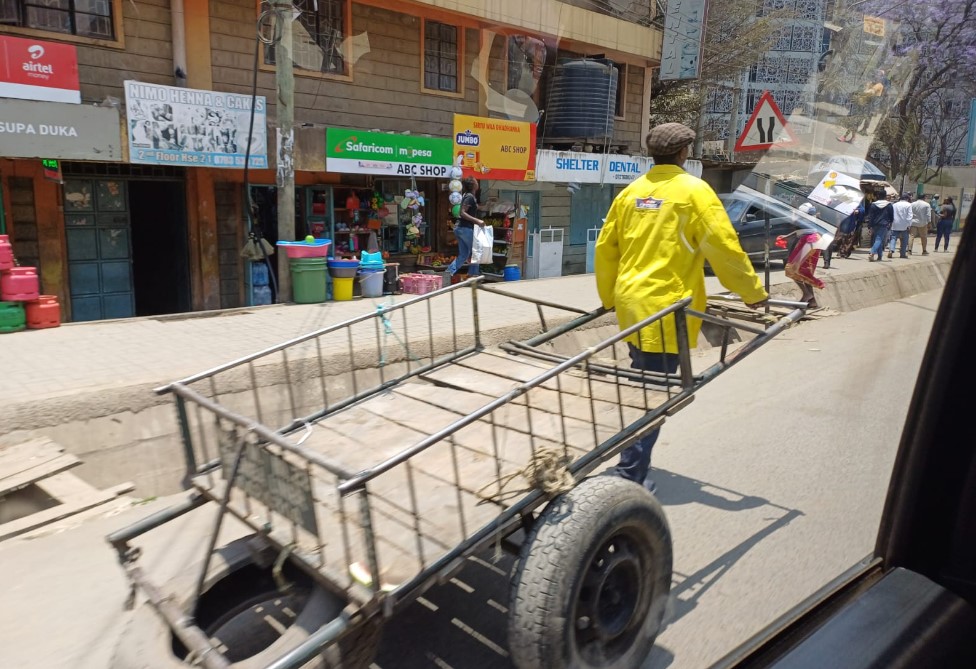Eastleigh’s handcart pushers doing the donkey work in urban transport

Scenes of men pulling them as others are packed outside shops waiting to deliver supplies are the order of the day here.
A peculiar phenomenon rocks the busy streets of the Eastleigh neighbourhood where the number of handcarts is as many as there are wholesale shops and apartment blocks.
Scenes of men pulling them as others are packed outside shops waiting to deliver supplies are the order of the day here.
More To Read
- Lack of streetlights on Eastleigh's Keroe Street raises security concerns
- Eastleigh traders accuse City Hall of inaction as unlicensed hawkers flood streets despite ban
- Mahiza Cafe and Bakery: Eastleigh’s chocolate and dessert factory serving pistachio dreams, boba, and halal elegance
- Hawkers celebrate fresh opportunities in Eastleigh’s Five Street
- Life behind the load: The hard road travelled by mkokoteni pushers
- Eastleigh hawkers suffer losses as heavy rains halt trade for third straight day
What is also unusual is the fact that hardly any is pulled by donkeys, the beast of burden whose transportation role is delegated to other areas.
This, according to locals and experts, is part of the evidence of declining numbers of donkeys in the country.
"Siku hizi sisi ndio punda (we do the donkey work nowadays). Donkeys are so rare here, so much so that carts are modelled for human beings not them. Though I would appreciate owning one to ease the burden I have carrying my tomatoes to these streets from Marikiti market, the fact that I deal with perishables denies me that comfort. My tomatoes would get rotten and I would be recording losses daily," says Anthony Mulwa who hawks tomatoes in the California area of Eastleigh.
Stephen Mwangangi, who uses his cart to sell water in estates within Eastleigh, says he had one donkey back in his village in Yatta, which he later sold as he relocated to Nairobi in search of greener pastures. He has not been able to replace it.
"Can one find a donkey in Nairobi? That would be difficult, I rarely see them. Even back in my village today, the donkeys are few but available. Most were slaughtered when the slaughterhouse in Matuu was functional. During the Covid pandemic, more were stolen and skinned. I remember even my family was a victim of this; we lost three to thieves," Mwangangi says.
Like many Kenyans, Mwangangi blames the declining numbers of donkeys in his village on the hard work the animal is subjected to, making them not reproduce as they should.
 Dr Vincent Oloo, a vet and senior animal health officer at Brooke East Africa. (Photo: Mary Wambui)
Dr Vincent Oloo, a vet and senior animal health officer at Brooke East Africa. (Photo: Mary Wambui)
Scientists say this is partly true. Naturally, donkeys are not as productive as other animals. The tough conditions they are subjected to can make a female donkey prolong its gestation period of 14 months. This means a female donkey can only reproduce once every three years.
"If you overwork any animal, the first system that slows down is the reproductive system," Dr Vincent Oloo, a vet and senior animal health officer at Brooke East Africa notes.
He explains that, despite advancements in technology and artificial insemination, retaining a high population of donkeys is still complicated as the conditions required to retain semen are difficult to achieve.
"You cannot do AI because semen can only survive at -196 degrees Celsius which is liquid nitrogen," he says.
This is part of the reason donkeys are a rarity in Eastleigh, a thriving business hub with multiple handcarts but hardly any donkeys.
"If you come across a donkey here, trust me, it must have come from elsewhere. I can't remember the last time I saw one," Joe Munyeki, a boda boda rider, says.
According to the 2009 census, the country had a donkey population of 1.8 million which dropped significantly over the next 10 years to 1.1million.
The drop was blamed on the establishment of donkey abattoirs that were found to be slaughtering more animals than were being birthed, forcing the government to enforce a ban on donkey slaughtering and the sale of donkey meat.
"About 40 per cent of the donkeys that were being slaughtered were expectant. This means there was a lot of foetal wastage," notes Samuel Theuri, a senior advocacy and innovations officer at Brooke East Africa.
At the time, the slaughtering was fuelled by a demand for donkey hide abroad for the manufacture of traditional Chinese medicine and beauty products.
The trade in donkey hides has diminished over time in the country but, reports of donkeys being stolen and skinned keep coming up.
"A multiplicity of issues arises from the loss of one donkey. In one instance, a woman told us that, when a woman loses a donkey she becomes a donkey herself," recalled Mr Theuri.
Research indicates that most donkeys are owned by the rural and urban poor.
Some rent them out to cart owners daily as a source of income while in most rural areas, they are used to plough, ferry produce to the market and assist women in domestic work, meaning when a theft occurs a major source of livelihood is lost.
Top Stories Today










































